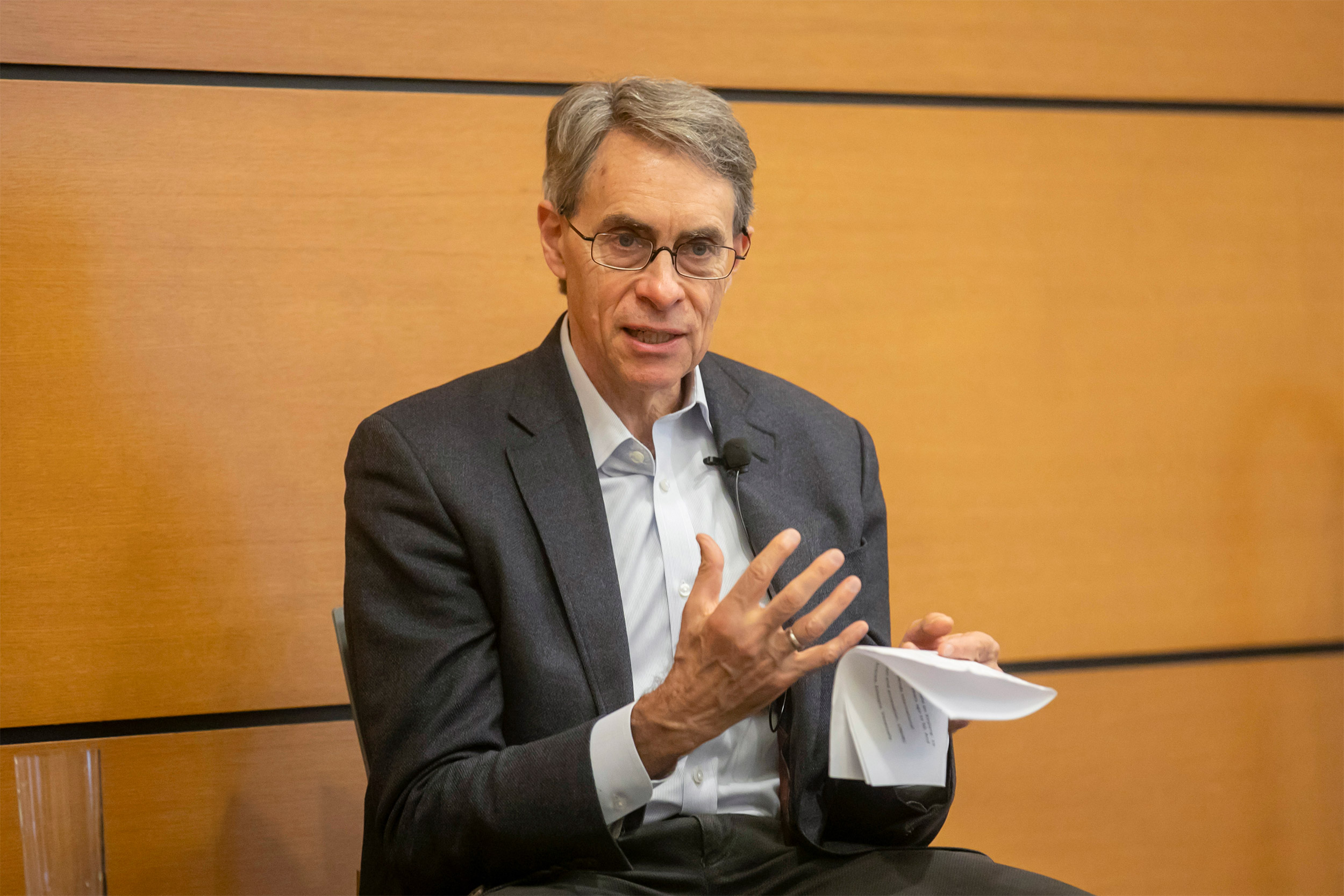
Kenneth Roth says autocrats tend to become more isolated as they consolidate power, and as a result they begin to make poorer decisions that start to weaken them.
Jon Chase/Harvard Staff Photographer
Is global tide turning in favor of autocrats?
Opposite is true, says former Human Rights Watch chief, but democracies must deal with destabilizing aggrievement
The successful mainstreaming of ideas and tactics that undermine institutions and values in American and Western European politics over the last decade has left many deeply worried that democracy is losing the battle against the global forces of autocracy.
Not so, said activist Kenneth Roth, former executive director of Human Rights Watch, during a talk last Thursday at Harvard Law School with Gerald L. Neuman, J. Sinclair Armstrong Professor of International, Foreign and Comparative Law.
While autocratic leaders still hold power in Russia, China, Iran, and elsewhere, many of those leaders are “really running scared” as their absolute authority over their citizens and perceived invincibility on the world stage has diminished in the last couple of years, said Roth, who is currently a fellow at Harvard Kennedy School’s Carr Center for Human Rights and at the University of Pennsylvania.
Autocrats tend to become more isolated as they consolidate power, and they begin to make poorer decisions that start to weaken them. With any sense that they’re losing control, they act more brutally and recklessly to preclude an insurgency, he said.
One clear example, Roth said, is Russian President Vladimir Putin’s “disastrous” underestimation of Ukraine’s fighting capabilities, which led him to launch an invasion last February, a decision that has cost as many as 200,000 Russian lives so far and exposed the nation’s military as grossly ill-prepared.
Another example, he said, is President Xi Jinping of China, who crushed a political uprising in Hong Kong, has threatened Taiwan, and “panicked” at protests over his COVID restrictions, lifting them with “zero preparation” for public health and economic needs at an “enormous cost to the people of China.”
“In my view, China and the Chinese government is the most serious threat to the global human rights movement there is today because of the combination of its intentionality, its desire to undermine that system, and the economic means to back that up,” said Roth, who was part of an effort to get the U.N. Human Rights Council to open a formal debate on China’s human rights record. The proposal was defeated by two votes last fall.
Roth was sharply critical of U.N. leadership for failing to publicly condemn China despite a 2022 report from the U.N.’s Office for the High Commissioner for Human Rights that said China’s treatment of its Uighur population in Western province of Xinjiang may constitute “international crimes and crimes against humanity.”
He said that the U.S. and a number of Western governments have “a real selectivity” when it comes to which autocratic governments they condemn and punish for human-rights records and which get a pass in favor of interests such as fossil fuels or trade.
President Biden is “weaponizing human rights,” said Roth, calling out some countries for violations where it is politically expedient to do so, but overlooking others, like Saudi Arabia or China, if building an alliance is deemed more important.
Just because some autocracies have been faltering lately doesn’t mean democracy is without its own weaknesses, Roth said.
“We do have a problem with democracy, and I think we have to recognize that and try to address it in order to prevail over the long term in promoting democracy,” he said. “The problem is that democratic government is not serving significant sectors of our societies.”
Many communities around the world most vulnerable to populist political appeals share some characteristics: their citizens are more rural, less educated, vote primarily on cultural issues, and haven’t benefited from the global economy. They are often members of an ethnic majority and while not necessarily at the lowest economic rung, “they feel disrespected and unloved and are ripe” for others “to exploit their discontent using an anti-rights message,” said Roth.
He suggested there is a tendency among those with more power to ignore this group’s feeling that government isn’t meeting their needs and that their diminished life prospects and economic stagnation are perhaps being overlooked because of illiberal views some may hold.
But, Roth said, “those are all things that we can and should do something about, and I think that is essential to revitalize democracy, and to contest this populist attack from within.”




